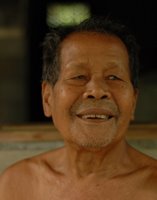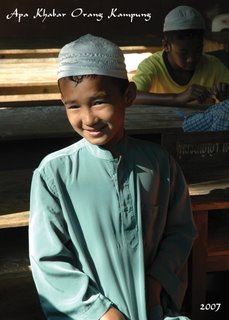By Fathi Aris OmarThe Star. 19 Oct 2006
PETALING JAYA: Not discouraged by the ban on
Lelaki Komunis Terakhir (
The Last Communist) in May, filmmaker Amir Muhammad is now completing a sequel to the controversial documentary.
The new film focuses on former Malay guerillas of the 10th Regiment of the defunct Communist Party of Malaya (CPM).
Named after
Apa Khabar Orang Kampung, a popular song by the late Sudirman Arshad, it records the daily lives of former CPM members staying in the Ban Chulabhorn Pattana 12 or the 12th Chulaborn Development Village, not far from the Narathiwat-Kelantan border.
The village, developed following a tripartite agreement between the CPM, the Malaysian Government and the Thai Government, is said to be the original base of the 1,000-strong 10th Regiment.
Of the 140-odd families currently living there, fewer than 20 residents were born in Malaya. Of these, 15 – now in their late 70s or early 80s – were interviewed for the sequel.
Amir, 34, said he and a five-man crew spent some 10 days in August recording the current way of life of the former guerillas.
According to him, one of those interviewed, Pak Majid – whose original name is Idris Yusof – had served in both the British and Japanese armies before joining the CPM.
“He said no one had ever asked him about his experience, so we talked for three hours. His story is very interesting,” Amir told mStar Online, The Star’s Bahasa Malaysia news portal.
Apart from interviews, the film will also incorporate CPM propaganda materials, including its radio broadcasts, films and leaflets.
Amir said the sequel had been planned earlier and not in reaction to the criticisms directed at
The Last Communist, banned following protests by various quarters, leading to a controversy involving film activists and politicians.
Hopefully, he added,
Apa Khabar Orang Kampung would be approved for commercial screening early next year.
The film, now in the editing stage, is scheduled for screening at a film festival in Iran in January.
Asked how confident he was that it would be approved by the Censorship Board, Amir said: “If
Remp-It can be approved, why not my film? There are no sex or violent scenes. Only old people talking.”
On a related note, Amir said the former guerillas were given 2.4ha of land each for agriculture development but none of their efforts was successful.
As a result, many of the young people from the village had migrated to other places to look for jobs.
In the light of the insurgency in the southern Thai provinces, he added, they had also been accused of involvement in the separatist groups.
Most of them had denied this and the Thai Government also believed they were not involved, he said.



